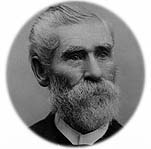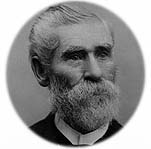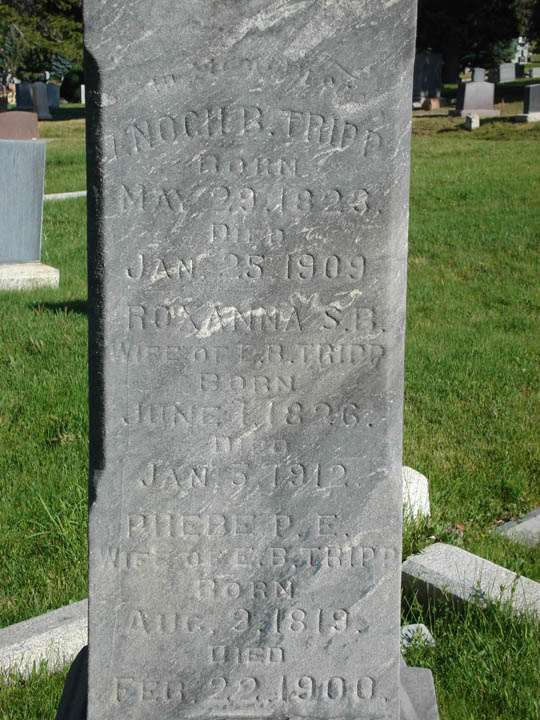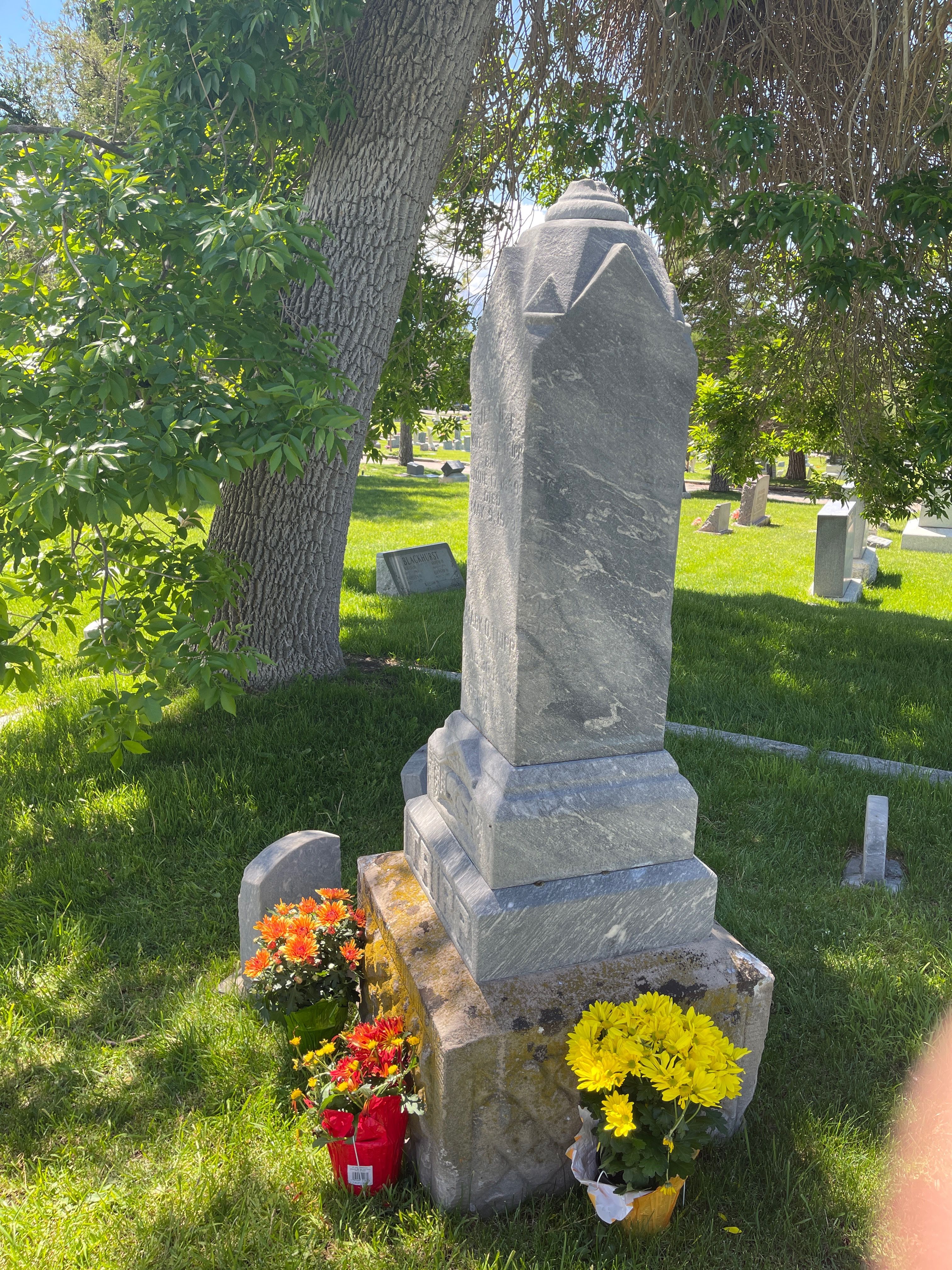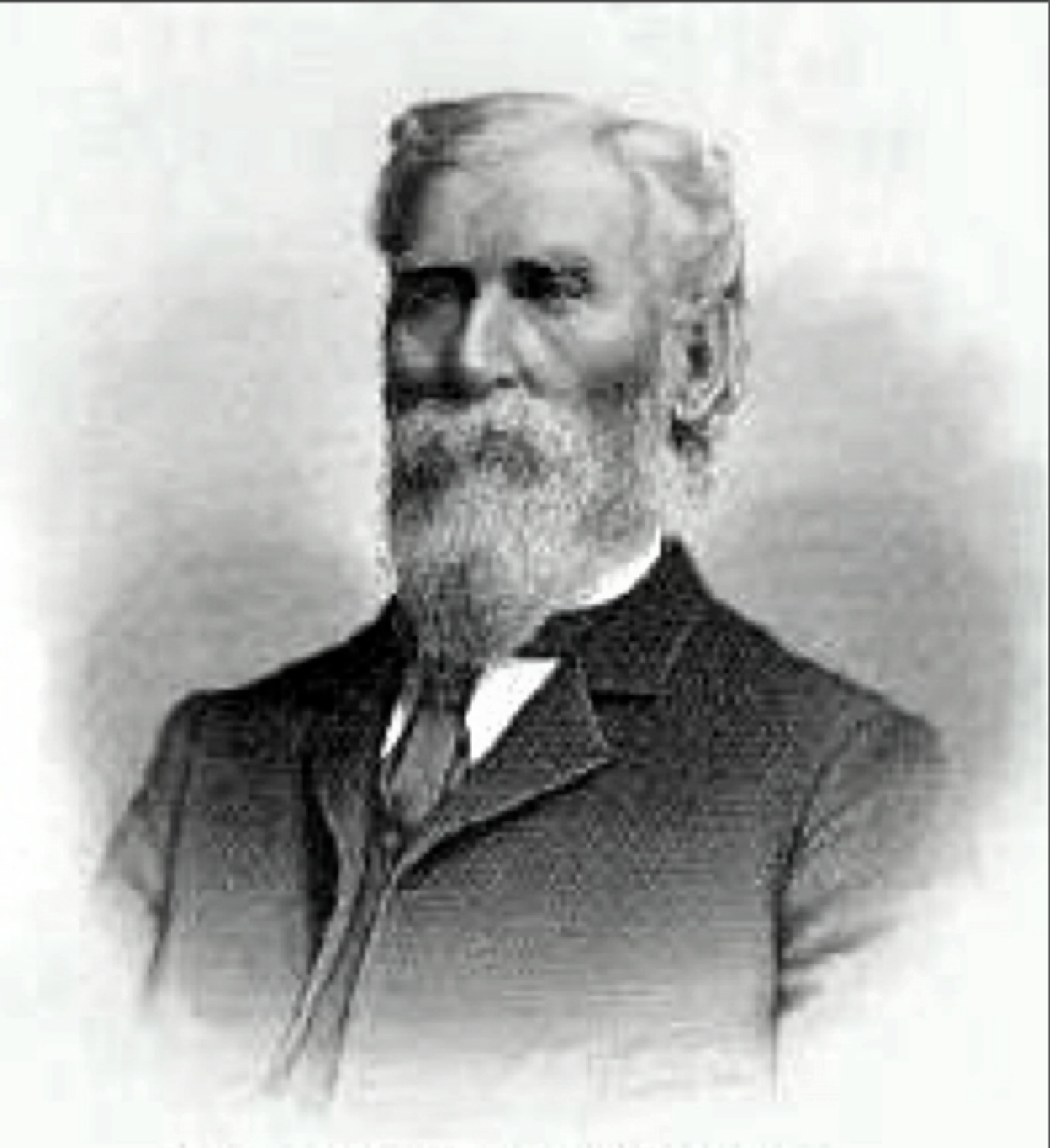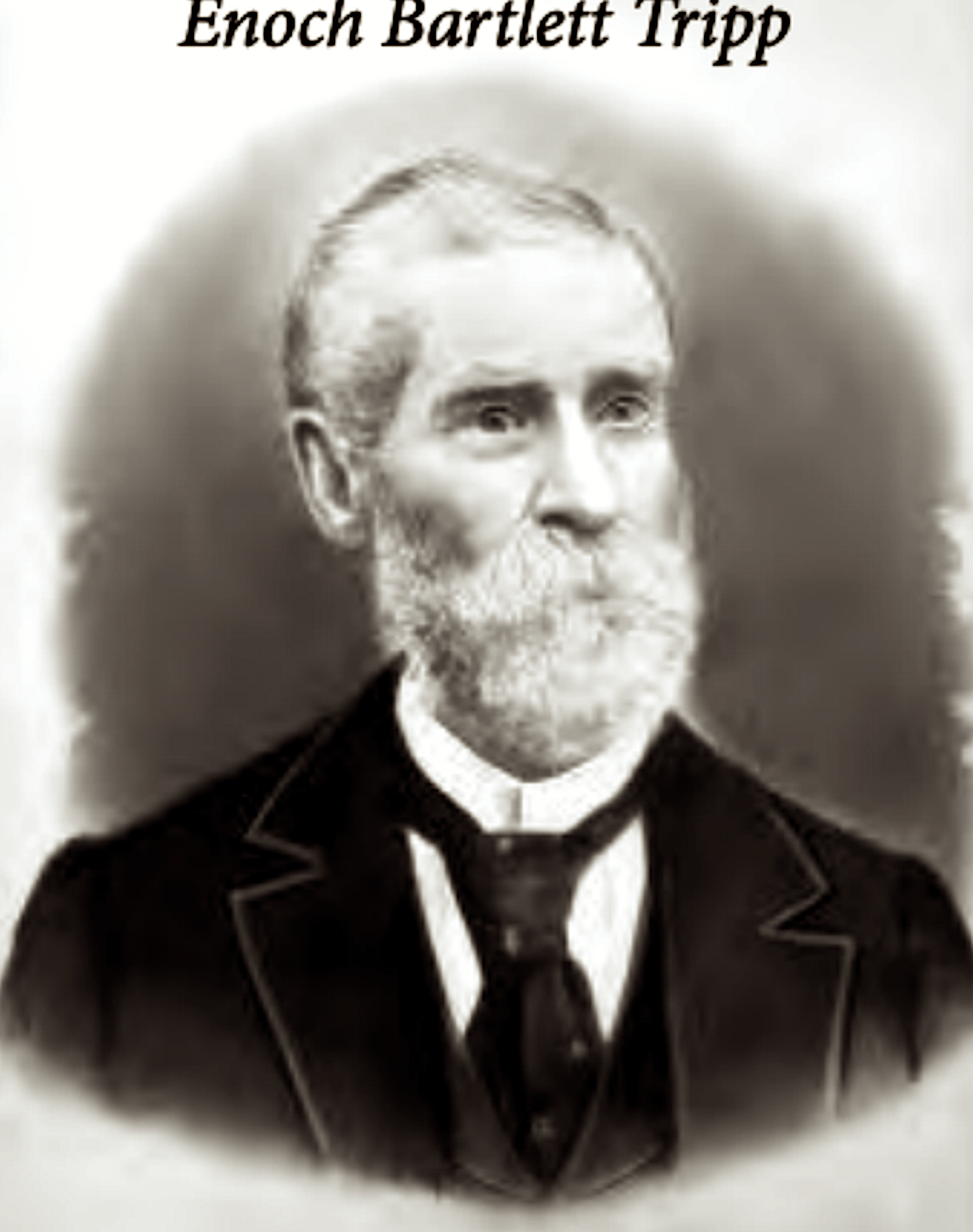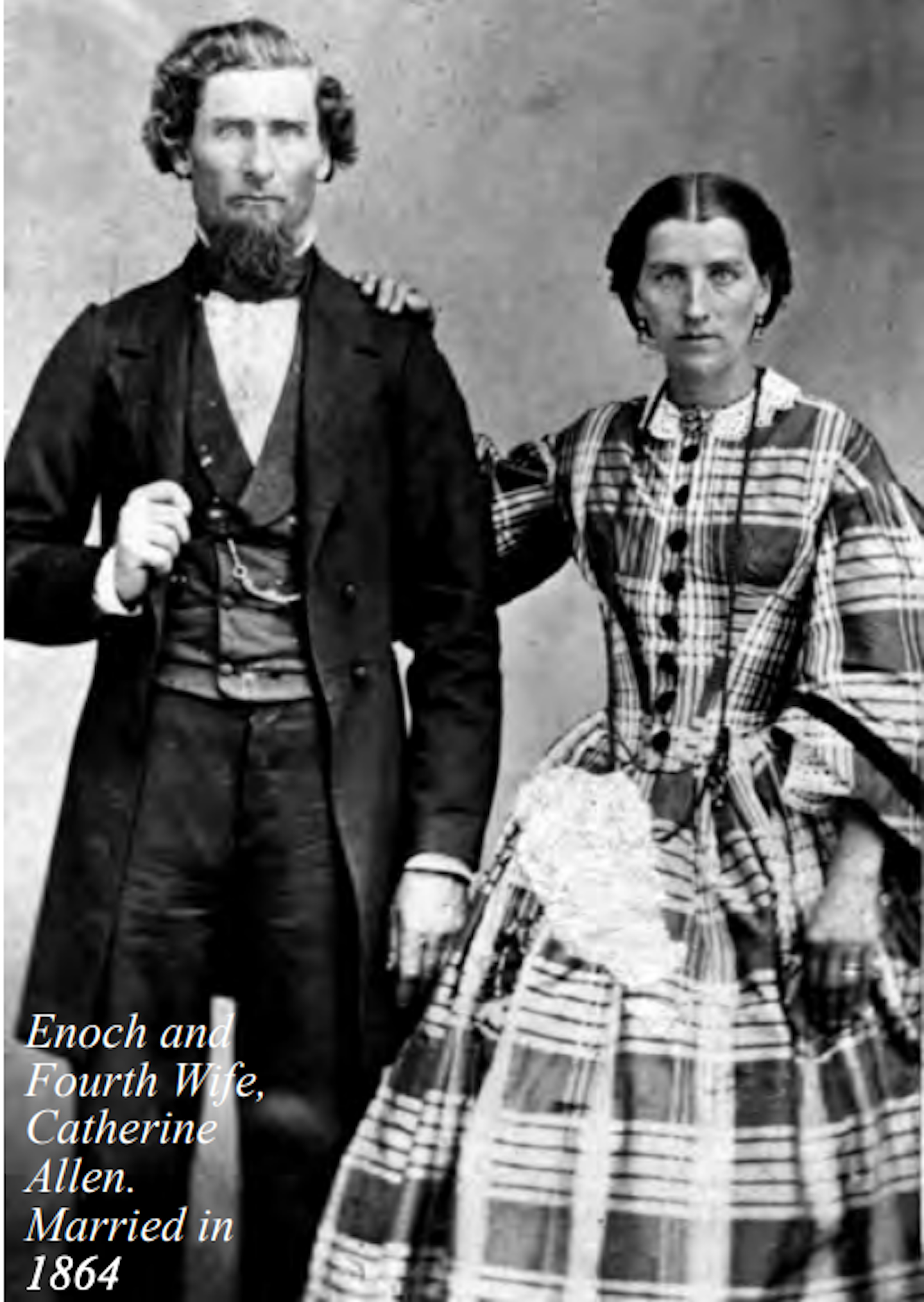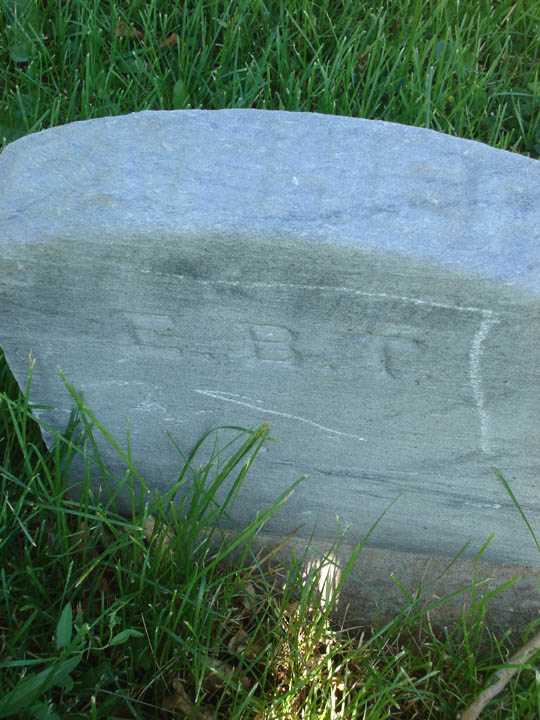Married Roxanna Sophia Billings, 29 Mar 1846, Nauvoo, Hancock, Illinois
Married Phebe Peterson Eastman, 2 Nov 1856, Salt Lake City, Salt Lake, Utah
Married Jessie Ann Eddins, 20 Mar 1857, Salt Lake City, Salt Lake, Utah
Married Catherine Jane Allen, 4 Jun 1864, Salt Lake City, Salt Lake, Utah
Married Mary Openshaw, 26 Oct 1888, Salt Lake City, Salt Lake, Utah
History - Enoch lived with his parents until he was about thirteen years old, by which time he had become proficient in the boot and shoe business, and had acquired a good common education. Fond of books, he was a moral lad, of steady and industrious habits. This reputation secured for him, in March, 1836, employment with a merchant named Plummer P. Todd, of South Ripley, who, being sheriff of the county and consequently much absent from home, had need of a good, reliable clerk. Enoch, though so young, answered every purpose of his employer, who trusted him implicitly, often leaving the store for many weeks entirely in his charge. He remained with Mr. Todd about seven months, when the latter died and Enoch returned to his father, at the village of Cambridge, resuming work in the shop and upon the farm. He was but fourteen when he was left in charge of his father's business, while his parents went upon a visit to his mother's kindred in the western part of the State.
Enoch continued to live with his parents until he was sixteen. He then set up a shoe shop at Cambridge, and with money thus earned paid for his father a balance of two hundred dollars due on a farm he had purchased. In recognition of this act, and of his past faithfulness, his father, on the 10th of May, 1841, released him from all obligations as to time and service during his minority, and made him a free man at eighteen, to do business in his own name. The youth now closed his business at Cambridge, and for two years attended the academy at Farmington, working at his trade during vacations, on Saturdays and at "odd spells." Then followed a year and a half at West Wilton, where he worked for Mr. Oliver Soper, and studied medicine under a Dr. Kilburn.
In September, 1845, he visited his parents at West Ripley, and was induced by Mr. Adonijah Webber to become his partner in a mercantile business at that place. The venture proved unprofitable, and Mr. Tripp soon drew out of it. At this time there was a great excitement about the western country, and he made up his mind to seek his fortune there.
It was the first day of November, 1845, when he bade farewell to his kindred and started upon his journey. He traveled by stage, railroad, canal-boat and steamboat, to Boston, Albany, Buffalo and Cleveland. At a hotel in the last-named city he saw an advertisement to the effect that the Mormons were selling out at a great sacrifice, to go to the Rocky Mountains, and that great bargains were to be had at Nauvoo. Thither he determined to go, and after a hard and perilous trip, involving a wreck on the Ohio river, finally reached Springfield, Illinois, and took stage to Carthage.
There, the landlord of the hotel, learning that he was going to Nauvoo, inquired if he was a Mormon. "I am not," said Mr. Tripp, "and never expect to be; I am going on a speculation; I understand they are selling their property at a great sacrifice." The landlord told him that it was very dangerous to go to Nauvoo at present, as the Mormons were killing all strangers that came that way, for their money, clothing and property; even on the sides of the streets dead men could be seen most of the time. "I asked why such things were allowed. He answered that they were going to put a stop to it, and had taken the law into their own hands for that purpose. They had already killed e Smith' and his brother Hyrum, and a posse was now out after 'Old Brigham Young,' the present leader, and he would soon share the same fate. He added that the Mormons kept armed men stationed around Nauvoo, for five miles out, to waylay people going into the city.
"My mind was wrought up to such a pitch that I was on the point of abandoning the trip, but as my mother's sister, Patty Sessions, and other relatives lived there, and I needed rest, I nerved myself for the ordeal. I knew that the Sessions family were good folks before they were Mormons, and were great friends to my folks, and I decided to go and place myself under their protection. No sooner had I made this resolve than I heard an awful tumult outside. The landlord informed me that the posse had just arrived with 'old Brigham Young.' In the morning, as we were taking our seats at the breakfast table, a lawyer came into the room and asked, 'Where is Brigham Young?' A certain person was pointed out to him. 'Oh h—ll!' he exclaimed—'that ain't Brigham Young— it's Bill Miller.' The officer of the posse was very indignant over the ruse practiced upon him, but the prisoner went free. Mr. Miller and I were the only passengers to Nauvoo. I reached there without molestation, and was warmly welcomed by my Mormon relatives."
Mr. Tripp, however, was much prejudiced against the Saints, thinking they were mostly thieves and murderers, but being introduced into their society and to some of their leading men, and noting their prayerfulness and purity of life, he concluded that the evil reports concerning them were not true. His record relates how he read the Church works, became converted, and was baptized by Heber C. Kimball, the Apostle, February 1, 1846. The next evening he was ordained a Seventy in the Nauvoo Temple, it being the last night that ordinances were performed in that sacred house.
On the 29th of March, the same year, Enoch B. Tripp married Roxanna Billings. The young husband, by advice, remained at Nauvoo after the main body of the Saints had departed, as one of the "new citizens," helping to protect property and the poor people left behind. That he might do this the more effectually he concealed the fact that he was a Mormon. He taught school for several months, and as a preceptor was very popular. Among his pupils were the children of the martyred Prophet—Joseph, Frederick, Alexander, and an adopted daughter named Julia. He continued his school until the mob came against the city, when he joined with his fellows in defending their homes against the invaders. He witnessed the death of Captain Anderson and his son, killed by the mob, also of Isaac Norris, who, with his breast torn open by a cannon ball, fell just in front of him, as he was riding to take a message to Captain Anderson from Major Clifford, who had been commissioned by the Governor of Illinois to defend Nauvoo. After the surrender, Mr. and Mrs. Tripp, having locked up their house, with all their effects in it except a little clothing and bedding that could be packed, took a steamboat that stopped at the landing for a few moments, and crossed to Burlington, Iowa, where they spent the winter.
There Mr. Tripp, after some difficulty, and when reduced to his last dime, found employment as a shoe-maker with a Mr. Vanderson, and was kindly aided by one of that gentleman's employees, William G. Hacket, who had known his father and his brother, General William Tripp, in the State of Maine. In the spring, through the kind offices of Mr. R. S. Adams, a leather merchant formerly of Boston, he established himself in the boot and shoe business at Wapello, Iowa, where he prospered, adding to his possessions in the spring of 1849 the drug store of C. M. McDaniel, who sold out very cheap in order to go to California. Mr. Tripp continued in both lines of trade and flourished, fitting out gold-hunters and other west-bound travelers until the fall of 1852, when he disposed of his stock and entered the dry goods and grocery business, wholesale and retail, also dealing largely in real estate. His business increased until it became a heavy burden upon him, taxing both body and mind.
He relates how Heber C. Kimball, on leaving Nauvoo, had told him that when the time came for him to rejoin his people he should be prompted by the Spirit; and how, on the night of February 7, 1853, he heard a voice, which said to him three times, "Get ye up into the Valleys of the Mountains." He obeyed the mandate, closing out his business, and fitting up four wagons, with four yoke of oxen to each wagon, for the journey across the plains. He also fitted up a large wagon for his wife and three children. This vehicle had all the conveniences and comforts of a house, the wagon-bed being on springs, with wide projections over the wheels for sitting or sleeping purposes. There was a stove for heating or cooking, a door with steps at the rear, and curtains all round to roll up or button down: in short, the wagon, even on a stormy day, was as comfortable as a room in a house. It was drawn by four large gentle mares. There was also a large family tent. Boxing up all his best goods and loading them into the four ox wagons, Mr. Tripp engaged for these eight teamsters, designing to drive the other team himself. Leaving the rest of his unsold property with an agent, he started on the third day of April for Utah. For prudential reasons he still maintained secrecy on the subject of his religious faith, and was supposed to be migrating to the Land of Gold. At Council Bluffs a company was organized with him as captain. He had a prosperous trip, and arrived at Salt Lake City on the 27th of July. He now informed his teamsters that he intended to stay in Utah. He paid them off, and all but one went on to California.
Mr. Tripp first settled at Bountiful, where his cousin, David Sessions lived. There he opened a store and found ready sale for his goods, dwelling meanwhile in his tent and wagon. About six weeks later he returned to Salt Lake City and bought a place in the Nineteenth Ward—a house of two rooms for which he paid five hundred dollars in goods, horses, wagon, etc. The balance of his merchandise he sold to William Nixon. Soon after this he bought a home in the Sixteenth Ward, completing a house partly built upon the lot by its former owner, Frederick Palmer. His next move was to purchase from Livingston and Kincaid a stock of imported leather, which he manufactured into boots and shoes. Thenceforth he continued in that line of business.
September, 1854 found him on his way to Texas, to fulfill a mission. He had as traveling companions across the plains John Taylor the Apostle, Preston Thomas, Nathanial H. Felt, Jeter Clinton and others. At the Missouri river they parted company. Elder Tripp, after transacting business at Wapello, Iowa, visited his aged parents in Maine, prior to proceeding to Texas. In New York City he contributed forty dollars to help President Taylor start "The Mormon." Subsequently the latter changed his mission from Texas to Maine, where he began laboring in January, 1855. There being a few Latter-day Saints in Bethel and Newry, he gathered them into a branch under the presidency of Josiah Smith, a relative by marriage of George A. Smith, the Church Historian. He organized another branch out of members living in the towns of Mexico and Rumford, appointing Osgood Virgin to preside over it. He was kindly received by his kindred, held many meetings in various parts, and some of them were attended by his sire, who on one occasion was invited by his son, after he had spoken, to address those assembled. The old gentleman, who was still a Methodist preacher, arose and remarked that he had listened with much interest to what his son had said, and that it was all Bible doctrine. He closed by saying that his own attitude towards Mormonism was illustrated by an anecdote of a man who, passing an orchard, said, as he saw in an apple tree a good many clubs thrown there by passers by, "Either there is fine fruit there, or else a hornet's nest." After baptizing a goodly number, Elder Tripp returned to Iowa, whither some of his converts accompanied him. In the spring of 1856, with another stock of goods, he set out for Salt Lake Valley. He reached home on the 15th of August, and found his family well, though his wife had lost an infant, his fourth son, born during the father's absence.
Mr. Tripp resumed business as boot and shoe manufacturer and merchant, and also began farming, having fifteen acres of land in the "Big Field" south of Salt Lake City. In April, 1857, he accompanied the First Presidency to Salmon River. After returning he closed up his mercantile business and turned his attention more particularly to farming. He was captain of militia in the Echo Canyon campaign, and in "the move" took his family to Provo. He notes, in his account of this episode, that it was the first time the Saints, after an exodus, returned to their homes.
In the winter of 1859–60 he taught school in the Sixteenth Ward, where he also acted as school trustee and watermaster. In 1860 he resumed the manufacture of boots and shoes, and in 1863 opened a tannery, making leather of all kinds. In 1865 he re-entered the mercantile business. In 1866–7 he had a saw-mill in Bingham Canyon, and a lumber yard in Salt Lake City, where he was justice of the peace for the Third Precinct. From October, 1867, to April, 1868, he was absent on the "Muddy Mission," from which he returned much improved in health. Agreeable to President Young's advice he now went out of business as a merchant, and devoted himself entirely to agriculture, living upon his farm of one hundred and ninety acres in South Cottonwood. There he was school trustee, water-master and justice of the peace.
He spent the winter of 1871–2 on a mission in Maine, visiting and preaching to his relatives and friends and gathering the genealogies of his ancestors. This was the last time he saw his parents. On parting with his father, the latter confessed to him a belief in the truth of Mormonism. His next trip to his native State was early in 1886, when he left home "on the underground" to elude the minions of the crusade. He visited the graves of his parents, was treated kindly by all he met, and returning home, spent the winter with his son Wallace at Willow Springs. In November, 1887, he was arrested and taken before U. S. Commissioner Norrell, charged with unlawful cohabitation under the Edmunds law. Nothing being found against him, the case was dismissed. Since that time he has lived upon his farm, working occasionally in the Temples, and realizing to the full a blessing pronounced upon him by President Young to the effect that his last days should be his healthiest, happiest and best.
Enoch B. Tripp, as already implied, has practiced the principle of plural marriage. He is the father of thirty-two children, and has sixty-five grandchildren and several great-grandchildren.
Married Roxanna Sophia Billings, 29 Mar 1846, Nauvoo, Hancock, Illinois
Married Phebe Peterson Eastman, 2 Nov 1856, Salt Lake City, Salt Lake, Utah
Married Jessie Ann Eddins, 20 Mar 1857, Salt Lake City, Salt Lake, Utah
Married Catherine Jane Allen, 4 Jun 1864, Salt Lake City, Salt Lake, Utah
Married Mary Openshaw, 26 Oct 1888, Salt Lake City, Salt Lake, Utah
History - Enoch lived with his parents until he was about thirteen years old, by which time he had become proficient in the boot and shoe business, and had acquired a good common education. Fond of books, he was a moral lad, of steady and industrious habits. This reputation secured for him, in March, 1836, employment with a merchant named Plummer P. Todd, of South Ripley, who, being sheriff of the county and consequently much absent from home, had need of a good, reliable clerk. Enoch, though so young, answered every purpose of his employer, who trusted him implicitly, often leaving the store for many weeks entirely in his charge. He remained with Mr. Todd about seven months, when the latter died and Enoch returned to his father, at the village of Cambridge, resuming work in the shop and upon the farm. He was but fourteen when he was left in charge of his father's business, while his parents went upon a visit to his mother's kindred in the western part of the State.
Enoch continued to live with his parents until he was sixteen. He then set up a shoe shop at Cambridge, and with money thus earned paid for his father a balance of two hundred dollars due on a farm he had purchased. In recognition of this act, and of his past faithfulness, his father, on the 10th of May, 1841, released him from all obligations as to time and service during his minority, and made him a free man at eighteen, to do business in his own name. The youth now closed his business at Cambridge, and for two years attended the academy at Farmington, working at his trade during vacations, on Saturdays and at "odd spells." Then followed a year and a half at West Wilton, where he worked for Mr. Oliver Soper, and studied medicine under a Dr. Kilburn.
In September, 1845, he visited his parents at West Ripley, and was induced by Mr. Adonijah Webber to become his partner in a mercantile business at that place. The venture proved unprofitable, and Mr. Tripp soon drew out of it. At this time there was a great excitement about the western country, and he made up his mind to seek his fortune there.
It was the first day of November, 1845, when he bade farewell to his kindred and started upon his journey. He traveled by stage, railroad, canal-boat and steamboat, to Boston, Albany, Buffalo and Cleveland. At a hotel in the last-named city he saw an advertisement to the effect that the Mormons were selling out at a great sacrifice, to go to the Rocky Mountains, and that great bargains were to be had at Nauvoo. Thither he determined to go, and after a hard and perilous trip, involving a wreck on the Ohio river, finally reached Springfield, Illinois, and took stage to Carthage.
There, the landlord of the hotel, learning that he was going to Nauvoo, inquired if he was a Mormon. "I am not," said Mr. Tripp, "and never expect to be; I am going on a speculation; I understand they are selling their property at a great sacrifice." The landlord told him that it was very dangerous to go to Nauvoo at present, as the Mormons were killing all strangers that came that way, for their money, clothing and property; even on the sides of the streets dead men could be seen most of the time. "I asked why such things were allowed. He answered that they were going to put a stop to it, and had taken the law into their own hands for that purpose. They had already killed e Smith' and his brother Hyrum, and a posse was now out after 'Old Brigham Young,' the present leader, and he would soon share the same fate. He added that the Mormons kept armed men stationed around Nauvoo, for five miles out, to waylay people going into the city.
"My mind was wrought up to such a pitch that I was on the point of abandoning the trip, but as my mother's sister, Patty Sessions, and other relatives lived there, and I needed rest, I nerved myself for the ordeal. I knew that the Sessions family were good folks before they were Mormons, and were great friends to my folks, and I decided to go and place myself under their protection. No sooner had I made this resolve than I heard an awful tumult outside. The landlord informed me that the posse had just arrived with 'old Brigham Young.' In the morning, as we were taking our seats at the breakfast table, a lawyer came into the room and asked, 'Where is Brigham Young?' A certain person was pointed out to him. 'Oh h—ll!' he exclaimed—'that ain't Brigham Young— it's Bill Miller.' The officer of the posse was very indignant over the ruse practiced upon him, but the prisoner went free. Mr. Miller and I were the only passengers to Nauvoo. I reached there without molestation, and was warmly welcomed by my Mormon relatives."
Mr. Tripp, however, was much prejudiced against the Saints, thinking they were mostly thieves and murderers, but being introduced into their society and to some of their leading men, and noting their prayerfulness and purity of life, he concluded that the evil reports concerning them were not true. His record relates how he read the Church works, became converted, and was baptized by Heber C. Kimball, the Apostle, February 1, 1846. The next evening he was ordained a Seventy in the Nauvoo Temple, it being the last night that ordinances were performed in that sacred house.
On the 29th of March, the same year, Enoch B. Tripp married Roxanna Billings. The young husband, by advice, remained at Nauvoo after the main body of the Saints had departed, as one of the "new citizens," helping to protect property and the poor people left behind. That he might do this the more effectually he concealed the fact that he was a Mormon. He taught school for several months, and as a preceptor was very popular. Among his pupils were the children of the martyred Prophet—Joseph, Frederick, Alexander, and an adopted daughter named Julia. He continued his school until the mob came against the city, when he joined with his fellows in defending their homes against the invaders. He witnessed the death of Captain Anderson and his son, killed by the mob, also of Isaac Norris, who, with his breast torn open by a cannon ball, fell just in front of him, as he was riding to take a message to Captain Anderson from Major Clifford, who had been commissioned by the Governor of Illinois to defend Nauvoo. After the surrender, Mr. and Mrs. Tripp, having locked up their house, with all their effects in it except a little clothing and bedding that could be packed, took a steamboat that stopped at the landing for a few moments, and crossed to Burlington, Iowa, where they spent the winter.
There Mr. Tripp, after some difficulty, and when reduced to his last dime, found employment as a shoe-maker with a Mr. Vanderson, and was kindly aided by one of that gentleman's employees, William G. Hacket, who had known his father and his brother, General William Tripp, in the State of Maine. In the spring, through the kind offices of Mr. R. S. Adams, a leather merchant formerly of Boston, he established himself in the boot and shoe business at Wapello, Iowa, where he prospered, adding to his possessions in the spring of 1849 the drug store of C. M. McDaniel, who sold out very cheap in order to go to California. Mr. Tripp continued in both lines of trade and flourished, fitting out gold-hunters and other west-bound travelers until the fall of 1852, when he disposed of his stock and entered the dry goods and grocery business, wholesale and retail, also dealing largely in real estate. His business increased until it became a heavy burden upon him, taxing both body and mind.
He relates how Heber C. Kimball, on leaving Nauvoo, had told him that when the time came for him to rejoin his people he should be prompted by the Spirit; and how, on the night of February 7, 1853, he heard a voice, which said to him three times, "Get ye up into the Valleys of the Mountains." He obeyed the mandate, closing out his business, and fitting up four wagons, with four yoke of oxen to each wagon, for the journey across the plains. He also fitted up a large wagon for his wife and three children. This vehicle had all the conveniences and comforts of a house, the wagon-bed being on springs, with wide projections over the wheels for sitting or sleeping purposes. There was a stove for heating or cooking, a door with steps at the rear, and curtains all round to roll up or button down: in short, the wagon, even on a stormy day, was as comfortable as a room in a house. It was drawn by four large gentle mares. There was also a large family tent. Boxing up all his best goods and loading them into the four ox wagons, Mr. Tripp engaged for these eight teamsters, designing to drive the other team himself. Leaving the rest of his unsold property with an agent, he started on the third day of April for Utah. For prudential reasons he still maintained secrecy on the subject of his religious faith, and was supposed to be migrating to the Land of Gold. At Council Bluffs a company was organized with him as captain. He had a prosperous trip, and arrived at Salt Lake City on the 27th of July. He now informed his teamsters that he intended to stay in Utah. He paid them off, and all but one went on to California.
Mr. Tripp first settled at Bountiful, where his cousin, David Sessions lived. There he opened a store and found ready sale for his goods, dwelling meanwhile in his tent and wagon. About six weeks later he returned to Salt Lake City and bought a place in the Nineteenth Ward—a house of two rooms for which he paid five hundred dollars in goods, horses, wagon, etc. The balance of his merchandise he sold to William Nixon. Soon after this he bought a home in the Sixteenth Ward, completing a house partly built upon the lot by its former owner, Frederick Palmer. His next move was to purchase from Livingston and Kincaid a stock of imported leather, which he manufactured into boots and shoes. Thenceforth he continued in that line of business.
September, 1854 found him on his way to Texas, to fulfill a mission. He had as traveling companions across the plains John Taylor the Apostle, Preston Thomas, Nathanial H. Felt, Jeter Clinton and others. At the Missouri river they parted company. Elder Tripp, after transacting business at Wapello, Iowa, visited his aged parents in Maine, prior to proceeding to Texas. In New York City he contributed forty dollars to help President Taylor start "The Mormon." Subsequently the latter changed his mission from Texas to Maine, where he began laboring in January, 1855. There being a few Latter-day Saints in Bethel and Newry, he gathered them into a branch under the presidency of Josiah Smith, a relative by marriage of George A. Smith, the Church Historian. He organized another branch out of members living in the towns of Mexico and Rumford, appointing Osgood Virgin to preside over it. He was kindly received by his kindred, held many meetings in various parts, and some of them were attended by his sire, who on one occasion was invited by his son, after he had spoken, to address those assembled. The old gentleman, who was still a Methodist preacher, arose and remarked that he had listened with much interest to what his son had said, and that it was all Bible doctrine. He closed by saying that his own attitude towards Mormonism was illustrated by an anecdote of a man who, passing an orchard, said, as he saw in an apple tree a good many clubs thrown there by passers by, "Either there is fine fruit there, or else a hornet's nest." After baptizing a goodly number, Elder Tripp returned to Iowa, whither some of his converts accompanied him. In the spring of 1856, with another stock of goods, he set out for Salt Lake Valley. He reached home on the 15th of August, and found his family well, though his wife had lost an infant, his fourth son, born during the father's absence.
Mr. Tripp resumed business as boot and shoe manufacturer and merchant, and also began farming, having fifteen acres of land in the "Big Field" south of Salt Lake City. In April, 1857, he accompanied the First Presidency to Salmon River. After returning he closed up his mercantile business and turned his attention more particularly to farming. He was captain of militia in the Echo Canyon campaign, and in "the move" took his family to Provo. He notes, in his account of this episode, that it was the first time the Saints, after an exodus, returned to their homes.
In the winter of 1859–60 he taught school in the Sixteenth Ward, where he also acted as school trustee and watermaster. In 1860 he resumed the manufacture of boots and shoes, and in 1863 opened a tannery, making leather of all kinds. In 1865 he re-entered the mercantile business. In 1866–7 he had a saw-mill in Bingham Canyon, and a lumber yard in Salt Lake City, where he was justice of the peace for the Third Precinct. From October, 1867, to April, 1868, he was absent on the "Muddy Mission," from which he returned much improved in health. Agreeable to President Young's advice he now went out of business as a merchant, and devoted himself entirely to agriculture, living upon his farm of one hundred and ninety acres in South Cottonwood. There he was school trustee, water-master and justice of the peace.
He spent the winter of 1871–2 on a mission in Maine, visiting and preaching to his relatives and friends and gathering the genealogies of his ancestors. This was the last time he saw his parents. On parting with his father, the latter confessed to him a belief in the truth of Mormonism. His next trip to his native State was early in 1886, when he left home "on the underground" to elude the minions of the crusade. He visited the graves of his parents, was treated kindly by all he met, and returning home, spent the winter with his son Wallace at Willow Springs. In November, 1887, he was arrested and taken before U. S. Commissioner Norrell, charged with unlawful cohabitation under the Edmunds law. Nothing being found against him, the case was dismissed. Since that time he has lived upon his farm, working occasionally in the Temples, and realizing to the full a blessing pronounced upon him by President Young to the effect that his last days should be his healthiest, happiest and best.
Enoch B. Tripp, as already implied, has practiced the principle of plural marriage. He is the father of thirty-two children, and has sixty-five grandchildren and several great-grandchildren.
Family Members
-
![]()
William Bartlett Tripp
1847–1891
-
![]()
Enoch Wallace Tripp
1849–1914
-
![]()
Robert Billings Tripp
1852–1937
-
![]()
Arnold Ondree Tripp
1855–1855
-
![]()
Oscar Lamoni Tripp
1857–1923
-
![]()
Roxanna Sophia "Roxie" Tripp Fenton
1857–1940
-
![]()
Emma Francis Tripp Bringhurst
1858–1926
-
![]()
Paschall Morrill Tripp
1860–1865
-
![]()
John Andrew Tripp
1861–1918
-
![]()
Sarah Ann "Sadie" Tripp Howard
1861–1937
-
Bartlett Tripp
1862–1864
-
Ellen Augusta Tripp Cook
1862–1908
-
![]()
Charles Albert Tripp
1863–1863
-
![]()
Ernest Alonzo Tripp
1863–1948
-
![]()
George Charles Tripp
1865–1927
-
![]()
Joseph Willard Tripp
1865–1932
-
![]()
Christopher John Tripp
1866–1959
-
![]()
Lucy Ann Tripp Maxfield
1867–1947
-
![]()
Elizabeth Tripp Wallin
1869–1927
-
![]()
Naamah Tripp Cahoon
1869–1948
-
![]()
Samuel Tripp
1871–1903
-
![]()
Harriet Eddins Tripp Hobbs
1871–1932
-
![]()
Enoch Bartlett Tripp
1874–1924
-
![]()
Albert Walter Tripp
1874–1930
-
![]()
Sophia Dazia Tripp
1876–1877
-
![]()
Lewis Edgar Tripp
1876–1942
-
Jessie Eddins Tripp
1878–1881
-
![]()
Rosetta Sarah Tripp Dunn
1878–1924
-
![]()
Louisa Tripp
1881–1881
-
Heber Chase Kimball Tripp
1882–1955
-
![]()
Mary Tripp Nelson
1893–1974
-
![]()
Stella Tripp Johnston
1894–1971
-
![]()
Brigham Young Tripp
1897–1940
Sponsored by Ancestry
Advertisement
Advertisement
